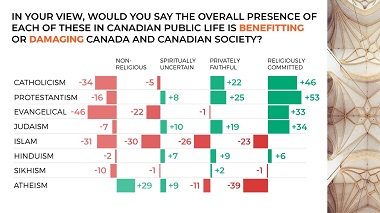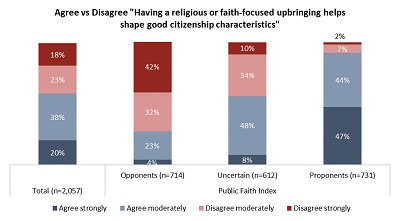 The second annual Public Faith Index underlines the harder side of Canadian secularism. This Cardus press release introduces a poll which considers the role of faith in modern society.
The second annual Public Faith Index underlines the harder side of Canadian secularism. This Cardus press release introduces a poll which considers the role of faith in modern society.
The findings of a new Angus Reid Institute (ARI) survey, produced in partnership with Cardus, are raising questions about the future of tolerance and virtue in Canada.
The 2019 Public Faith Index has found that the more religious Canadians are, the more likely they are to take a positive view of faiths different from their own.
By contrast, when non-religious Canadians were asked whether various faiths were “benefitting or damaging Canada and Canadian society,” they took a dim view of every community but their own:
“When it comes to faith, religion in Canada encourages tolerance of others,” said Ray Pennings, executive vice president of Cardus. “Non-believers were generally unwelcoming of all religions, though they seem especially hostile to Islam, Catholicism and Evangelical Christianity.”
The findings come as part of the annual Public Faith Index, developed by Cardus and ARI to measure Canadian mindsets regarding religious faith in public life. The latest index confirms Canadians are almost equally divided among three groups:
- Public Faith Proponents, who recognize the importance of faith and religion to society
- Public Faith Opponents, who are the most enthusiastic about secularism and want to reduce the role and presence of faith and religion
- the Uncertain, who take a middle position
 Public Faith Opponents were much less likely to support the Charter-protected, fundamental human right of religious freedom. Only 37 percent of that group agrees religious freedom makes Canada a better country, while more than one in four of them say it makes Canada worse.
Public Faith Opponents were much less likely to support the Charter-protected, fundamental human right of religious freedom. Only 37 percent of that group agrees religious freedom makes Canada a better country, while more than one in four of them say it makes Canada worse.
By contrast, 86 percent of Public Faith Proponents favour religious freedom for all.
Regarding religious symbols or clothing in the workplace, the most secular respondents had the lowest tolerance for such expressions. Fully 56 percent of Public Faith Opponents were uncomfortable with religious symbols or clothing in the workplace, compared to just one in five Public Faith Proponents.
The data also uncovered a marked contrast in attitudes regarding public virtue. Almost two-thirds of Public Faith Opponents prioritized “achieving one’s own dreams and happiness” over “being concerned about helping others” as the best way to live life. For Public Faith Proponents, however, 54 percent prioritized helping others.
So, what does faith-motivated help for others look practically and what could be lost by privatizing faith?
- Religious Canadians give generously. Statistics Canada states that 54% of primary donors to charity (the top 10% of all donors) attend religious services weekly, compared to just 14% of other donors and 8% of non-donors. Religious donors also give more than 3.5 times more to charity than other types of donors.
- Religious congregations benefit their neighbourhoods and communities. Each dollar in a religious congregation’s budget provides almost five times as much common good benefit to its surrounding community.
- Religious groups help those outside their faith. Culture and arts groups, recreation and sports programs, and social clubs are among the top groups losing out from church building closures.
- Religious communities help newcomers to Canada. Half of immigrants to Canada say they received material support from faith communities, including help finding a job or a home.
“Hard secularism carries a social cost by undermining religious freedom and silencing faith – one of the prime motivators for tolerance of others, public virtue, and generosity in Canada,” said Pennings.
“All religious communities have their warts, but that doesn’t change the fact that synagogues, mosques, temples and churches are like special machines that convert Canadians’ compassion into billions of dollars of goodwill.”
Full survey results are available online.
Daniel Proussalidis is director of communications for Cardus.
- December 19 note:
The Angus Reid Institute released a Christmas-themed study today, which included this:
For example, in 1988, 27 per cent of Canadians said this season was primarily a religious celebration. Today, just one-in-ten (10%) say the same. And while more Canadians today say the season is centered around fun and festivities, rather than faith (53%), the number who believe Christmas is equally about secular joy and religious observance has grown as well (from 28% to 34%).
Go here for the full study.

Evangelical Christianity is seen as more detrimental to Canadian life than Islam? I’m pretty sure this isn’t an indictment of the evangelical community in Canada as some would claim, as much as it is of the media covering the evangelical community (thinking of media coverage of TWU’s failed bid to open a law school).